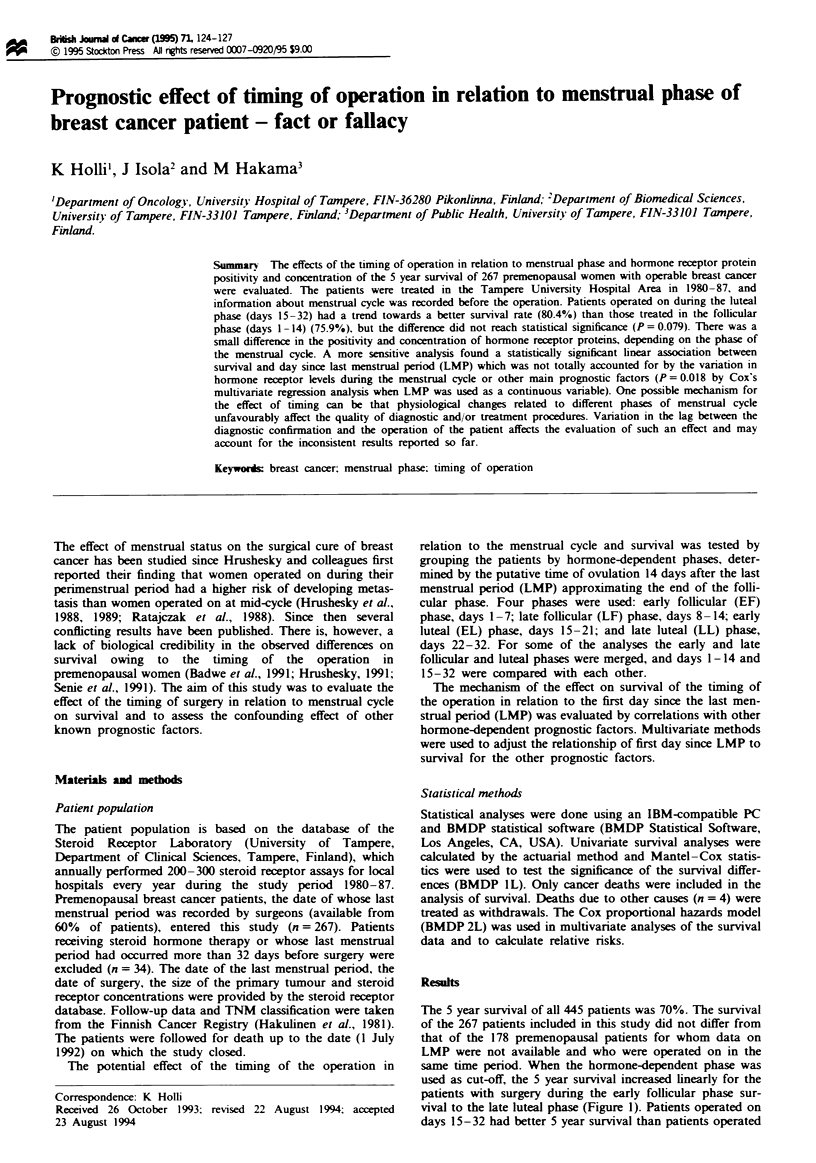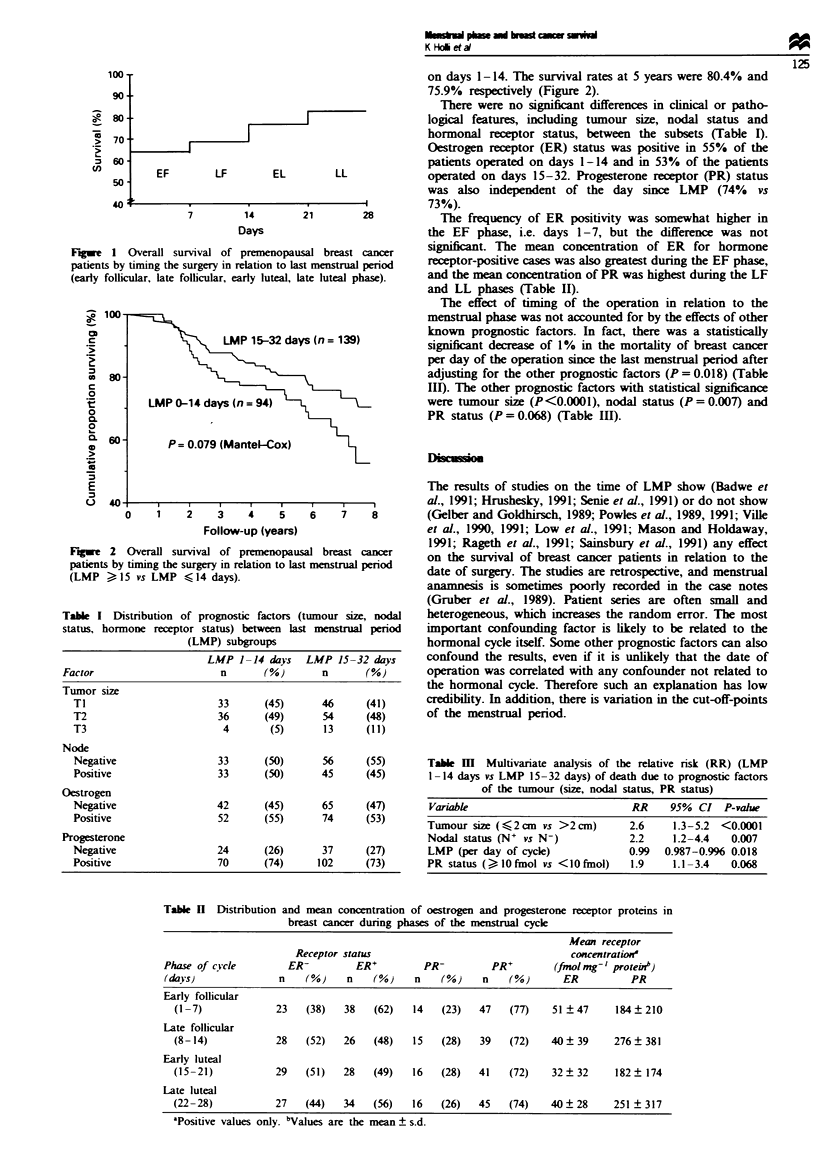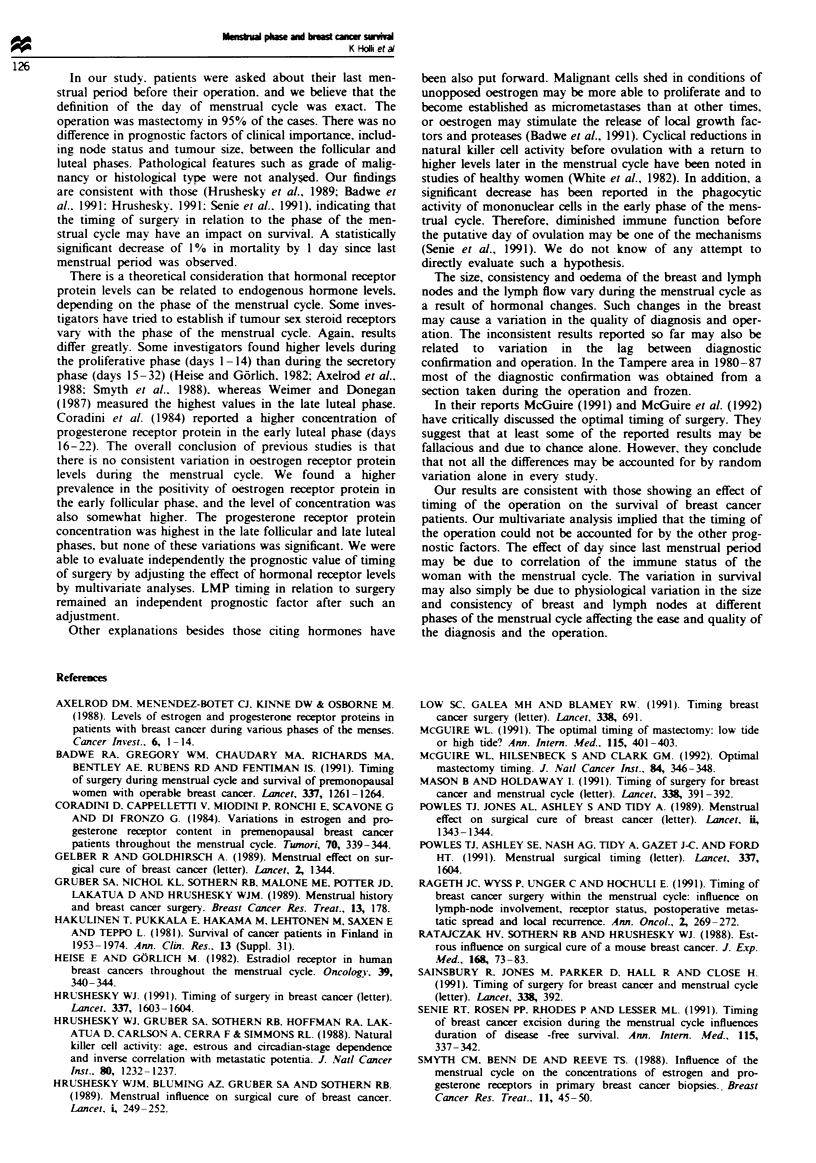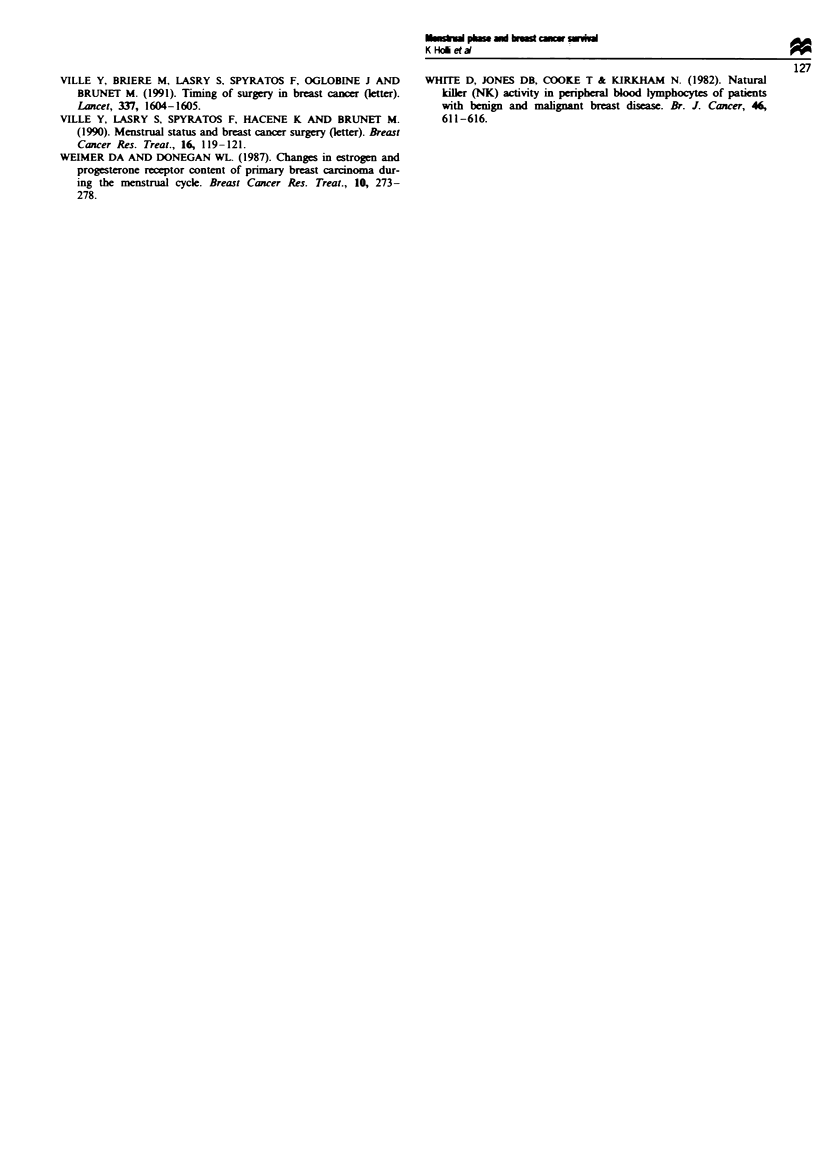Abstract
The effects of the timing of operation in relation to menstrual phase and hormone receptor protein positivity and concentration of the 5 year survival of 267 premenopausal women with operable breast cancer were evaluated. The patients were treated in the Tampere University Hospital Area in 1980-87, and information about menstrual cycle was recorded before the operation. Patients operated on during the luteal phase (days 15-32) had a trend towards a better survival rate (80.4%) than those treated in the follicular phase (days 1-14) (75.9%), but the difference did not reach statistical significance (P = 0.079). There was a small difference in the positivity and concentration of hormone receptor proteins, depending on the phase of the menstrual cycle. A more sensitive analysis found a statistically significant linear association between survival and day since last menstrual period (LMP) which was not totally accounted for by the variation in hormone receptor levels during the menstrual cycle or other main prognostic factors (P = 0.018 by Cox's multivariate regression analysis when LMP was used as a continuous variable). One possible mechanism for the effect of timing can be that physiological changes related to different phases of menstrual cycle unfavourably affect the quality of diagnostic and/or treatment procedures. Variation in the lag between the diagnostic confirmation and the operation of the patient affects the evaluation of such an effect and may account for the inconsistent results reported so far.
Full text
PDF



Selected References
These references are in PubMed. This may not be the complete list of references from this article.
- Badwe R. A., Gregory W. M., Chaudary M. A., Richards M. A., Bentley A. E., Rubens R. D., Fentiman I. S. Timing of surgery during menstrual cycle and survival of premenopausal women with operable breast cancer. Lancet. 1991 May 25;337(8752):1261–1264. doi: 10.1016/0140-6736(91)92927-t. [DOI] [PubMed] [Google Scholar]
- Coradini D., Cappelletti V., Miodini P., Ronchi E., Scavone G., Di Fronzo G. Variations in estrogen and progesterone receptor content in premenopausal breast cancer patients throughout the menstrual cycle. Tumori. 1984 Aug 31;70(4):339–344. doi: 10.1177/030089168407000408. [DOI] [PubMed] [Google Scholar]
- Heise E., Görlich M. Estradiol receptor in human breast cancers throughout the menstrual cycle. Oncology. 1982;39(6):340–344. doi: 10.1159/000225667. [DOI] [PubMed] [Google Scholar]
- Hrushesky W. J., Gruber S. A., Sothern R. B., Hoffman R. A., Lakatua D., Carlson A., Cerra F., Simmons R. L. Natural killer cell activity: age, estrous- and circadian-stage dependence and inverse correlation with metastatic potential. J Natl Cancer Inst. 1988 Oct 5;80(15):1232–1237. doi: 10.1093/jnci/80.15.1232. [DOI] [PubMed] [Google Scholar]
- McGuire W. L., Hilsenbeck S., Clark G. M. Optimal mastectomy timing. J Natl Cancer Inst. 1992 Mar 4;84(5):346–348. doi: 10.1093/jnci/84.5.346. [DOI] [PubMed] [Google Scholar]
- McGuire W. L. The optimal timing of mastectomy: low tide or high tide? Ann Intern Med. 1991 Sep 1;115(5):401–403. doi: 10.7326/0003-4819-115-5-401. [DOI] [PubMed] [Google Scholar]
- Rageth J. C., Wyss P., Unger C., Hochuli E. Timing of breast cancer surgery within the menstrual cycle: influence on lymph-node involvement, receptor status, postoperative metastatic spread and local recurrence. Ann Oncol. 1991 Apr;2(4):269–272. doi: 10.1093/oxfordjournals.annonc.a057935. [DOI] [PubMed] [Google Scholar]
- Ratajczak H. V., Sothern R. B., Hrushesky W. J. Estrous influence on surgical cure of a mouse breast cancer. J Exp Med. 1988 Jul 1;168(1):73–83. doi: 10.1084/jem.168.1.73. [DOI] [PMC free article] [PubMed] [Google Scholar]
- Senie R. T., Rosen P. P., Rhodes P., Lesser M. L. Timing of breast cancer excision during the menstrual cycle influences duration of disease-free survival. Ann Intern Med. 1991 Sep 1;115(5):337–342. doi: 10.7326/0003-4819-115-5-337. [DOI] [PubMed] [Google Scholar]
- Smyth C. M., Benn D. E., Reeve T. S. Influence of the menstrual cycle on the concentrations of estrogen and progesterone receptors in primary breast cancer biopsies. Breast Cancer Res Treat. 1988 Apr;11(1):45–50. doi: 10.1007/BF01807557. [DOI] [PubMed] [Google Scholar]
- Ville Y., Lasry S., Spyratos F., Hacène K., Brunet M. Menstrual status and breast cancer surgery. Breast Cancer Res Treat. 1990 Sep;16(2):119–121. doi: 10.1007/BF01809296. [DOI] [PubMed] [Google Scholar]
- Weimer D. A., Donegan W. L. Changes in estrogen and progesterone receptor content of primary breast carcinoma during the menstrual cycle. Breast Cancer Res Treat. 1987 Dec;10(3):273–278. doi: 10.1007/BF01805764. [DOI] [PubMed] [Google Scholar]
- White D., Jones D. B., Cooke T., Kirkham N. Natural killer (NK) activity in peripheral blood lymphocytes of patients with benign and malignant breast disease. Br J Cancer. 1982 Oct;46(4):611–616. doi: 10.1038/bjc.1982.245. [DOI] [PMC free article] [PubMed] [Google Scholar]


